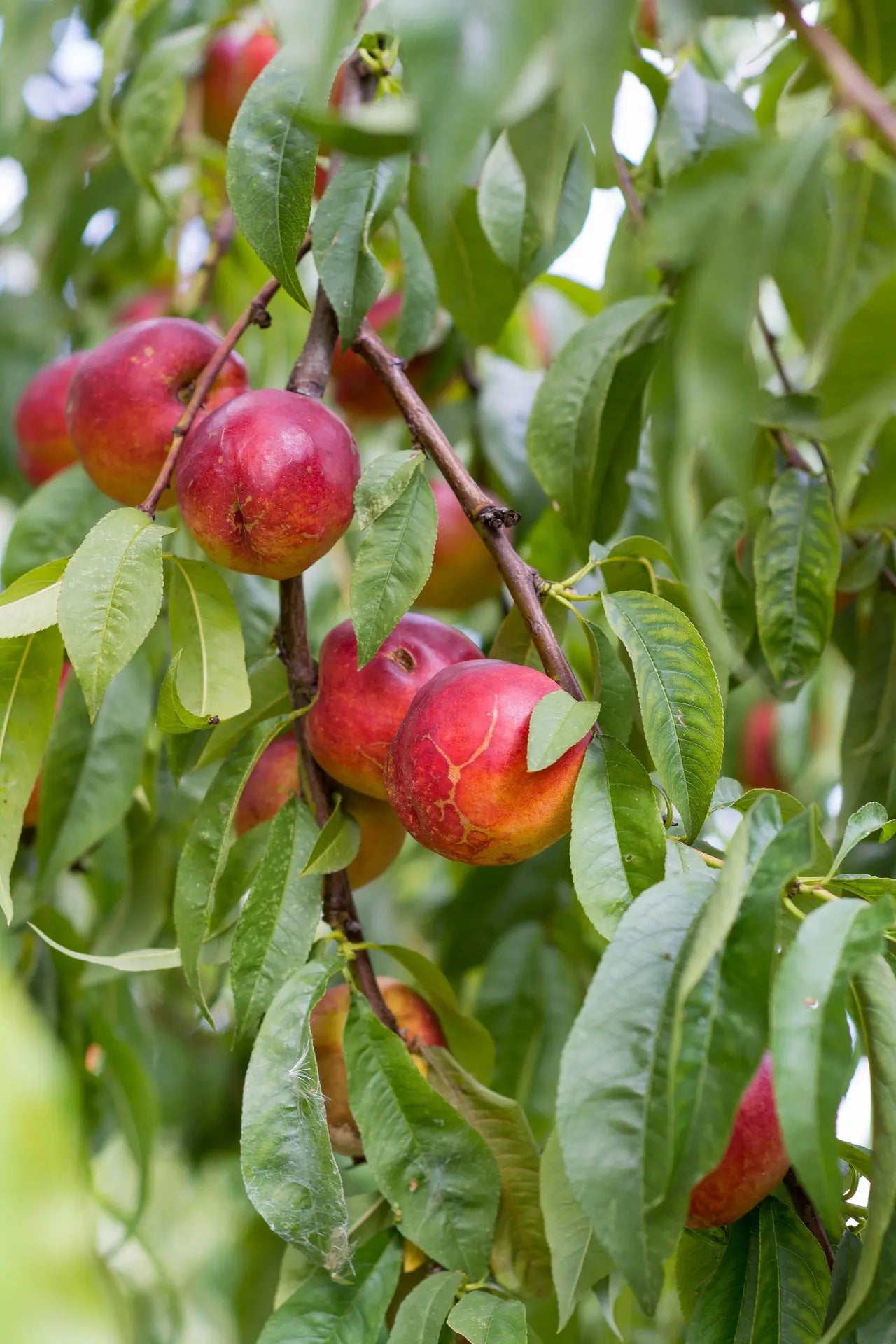-
Delivery from 10 plants to France, Switzerland and Europe
Delivery method -
Fruit Tree Wholesale Supplier
About Us -
Quality Fruit Tree Plants
Technical itinerary
Fantasia Nectarine Half-Standard Tree 6-8 cm diameter bare-root
Fantasia Nectarine Half-Standard Tree 6-8 cm diameter bare-root
The prices shown are our base prices for large volumes. Depending on the quantity ordered and the producers’ pricing scales, the rate may be adjusted upward. Each quote is personalized to ensure you receive a fair price.
Mini order 10 units / Multiple orders 10 units (FRS202412002)
Couldn't load pickup availability
 Buy now and get it delivered when you're ready to plant - Add your desired date to your quote request
Buy now and get it delivered when you're ready to plant - Add your desired date to your quote request
- Delivery from 10 plants to France, Switzerland and Europe

Technical sheet of the Fantasia nectarine variety
- Fruit flesh color: Yellow, juicy and sweet.
- Skin color: Bright red on an orange-yellow background.
- Size and shape: Large, slightly elongated. Round fruits.
- Tree Size: Can grow up to 5m tall and 3m wide.
- Fruit maturity: End of August or beginning of September.
- Fruit Taste: Juicy, sweet, and slightly tangy.
- Earliness of the variety: Late.
- Fruiting period: The fruits are harvested in late August or early September.
- Disease resistance and storage: Sensitive to spring frosts. Susceptible to peach leaf curl. Fruits do not keep for long, approximately less than a month, depending on storage conditions.
- Variety yield: A well-established tree can produce several dozen kilograms of fruit each year.
- Self-fertile? Generally considered self-fertile, but yields are higher if two trees of the same variety are planted next to each other.
-
Commercial use:
- Fresh consumption.
- Processing into jams, compotes, pastries and other desserts.
-
Comments:
- American origin.
- Very hardy, able to withstand temperatures down to -15°C.
- Prefers cool, well-drained soil.
- Fertilization is carried out in the fall with organic manure.
Quick read / the essentials on the Fantasia Nectarine tree
The Fantasia nectarine tree is a popular variety among professional growers due to its remarkable vigor and productivity. Its large fruits have bright red skin on an orange-yellow background and offer juicy yellow flesh, perfectly balancing sugar and acidity. To meet the expectations of French producers, Arboriverse, a specialist wholesale supplier of nectarine plants , offers this variety renowned for its agronomic benefits and high taste quality.
If you are looking to buy Fantasia nectarine plants , it is important to note that this tree, with its medium development and semi-spreading habit, ensures a generous and regular harvest, with late maturity extending from late August to early September. It is self-fertile , but its production is optimized by the presence of other nectarine or peach trees promoting cross-pollination. Its resistance to cold (-20°C) and drought makes it an excellent choice for French orchards, provided that good irrigation management is ensured during periods of prolonged heat.
As a specialist wholesale supplier of nectarine plants , Arboriverse provides arborists with carefully selected plants adapted to local growing conditions. The Fantasia nectarine tree requires well-drained, rich and light soil, avoiding excess lime or moisture. To combat fungal diseases such as peach leaf curl or brown rot, preventative protection with Bordeaux mixture and light pruning are essential.
If you are a grower looking to buy Fantasia nectarine plants , you should know that its high yield and commercial appeal make this variety a worthwhile investment. Its semi-spreading habit makes it easy to maintain and harvest, and its adaptation to rootstocks such as Saint Julien A ensures stable production. Thanks to Arboriverse, a specialist wholesale supplier of nectarine plants , you can benefit from robust and high-performance plants for a prosperous and productive orchard.
Presentation of the Fantasia Nectarine Tree for Professional Arborists in France
The Fantasia nectarine tree is an American variety particularly appreciated for its vigor, productivity, and the exceptional quality of its fruit. It is distinguished by its large, slightly elongated nectarines with bright red skin on an orange-yellow background. Its juicy, sweet yellow flesh offers a slight acidity that gives it an excellent flavor balance.
Commercially, this variety is highly prized for fresh consumption, although its shelf life is relatively short, not exceeding one month depending on storage conditions. It can also be made into jams, compotes or pastries.
A vigorous and productive tree
The Fantasia nectarine tree is a medium-sized tree that can reach five meters in height and three meters in width. Its semi-spreading shape makes it easy to care for and harvest. Particularly vigorous and productive, it offers regular and generous yields, with several dozen kilograms of fruit per year on a well-managed adult tree.
Its late flowering, which occurs in April, limits the risks associated with spring frosts, although it is still sensitive to them. The fruit also ripens late, with harvesting taking place between the end of August and the beginning of September.
Self-fertile, this variety can produce on its own, but its yields are improved in the presence of other nectarine or peach trees which encourage cross-pollination.
Growing conditions and resistance to climatic constraints
The Fantasia nectarine tree is adapted to temperate climates and is quite hardy. It is resistant to winter frosts down to -20°C, but remains vulnerable to late frosts which can affect flowering. It thrives in sunny locations and in light, rich, well-drained soils. Too much limestone can be problematic, as can excess moisture which can lead to root asphyxiation.
One of the major advantages of this variety is its excellent resistance to drought. This makes it a tree well-suited to regions where water can be a limited resource. However, during periods of prolonged high heat, careful irrigation is still necessary to ensure optimal production and quality fruit.
Susceptibility to diseases and pests
Like most peach and nectarine trees, Fantasia is susceptible to certain fungal diseases. Peach leaf curl is one of the main risks and requires preventative treatments, particularly with Bordeaux mixture in late winter. It can also be affected by bacterial canker and brown rot, which require careful monitoring and copper applications before flowering.
In terms of pests, this variety can be prone to aphid attacks and bacterial leaf spot. Using black soap spray or natural solutions based on horsetail and nettle can help limit their impact.
Suitable cultural practices and rootstocks
Pruning the Fantasia nectarine tree is a key step in optimizing production. It should be done just before flowering to renew the fruit-bearing branches and aerate the canopy. Pruning too severely every year could weaken the tree, but regular maintenance helps ensure consistent production and limit the spread of disease.
On the fertilization side, applying organic manure in the fall helps nourish the tree for the following season. Wood ash, rich in potash, can also be used to stimulate flowering and fruiting.
The choice of rootstock plays a vital role in the success of the crop. Saint Julien A is one of the most commonly used rootstocks, ensuring good adaptation to French soils while limiting excessive tree vigor.
A clear economic interest for producers
The Fantasia nectarine tree is a good choice for growers looking for a high-yielding variety with strong commercial appeal. Its fruit appeals to consumers with its attractive appearance and delicious taste, making it easy to sell on the fresh market.
Despite its susceptibility to disease and short shelf life, this variety remains a safe bet for professionals. Strict crop management helps optimize production and ensure a quality harvest that meets market expectations. Thanks to its drought resistance and good adaptation to well-drained soils, it fits perfectly into French orchards and offers interesting prospects for demanding producers.
To summarize: Nectarinier Fantasia
The Fantasia nectarine tree is distinguished by its vigor and high yield, appealing to arborists looking for a high-performance and attractive variety for fresh sale. Its nectarines with bright red skin and sweet yellow flesh offer an excellent taste balance, ensuring strong market demand. As a specialist wholesale supplier of nectarine plants , Arboriverse supports producers by providing them with high-quality plants, selected to guarantee optimal productivity.
If you're considering purchasing Fantasia nectarine plants , it's crucial to master its care. Its semi-spreading habit and late flowering reduce the risk of spring frosts, although protection against common diseases like peach leaf curl and brown rot is necessary. With careful cultural management, including proper pruning and balanced fertilization, this variety guarantees regular and abundant harvests.
Thanks to Arboriverse, a specialist wholesale supplier of nectarine plants , professionals benefit from plants adapted to the specificities of the French climate, resistant to drought and efficient in production. The choice of rootstock also plays a key role: Saint Julien A is particularly recommended to optimize the vigor and adaptability of Fantasia to drained soils.
Choosing the Fantasia nectarine tree means investing in a variety with many commercial advantages. Its late harvest and taste quality make it a must-have for orchards intended for the fresh market. If you want to buy Fantasia nectarine plants , trust Arboriverse , your expert partner for robust and productive plants.
-
Fantasia Nectarine Scion bare-root
Regular price €10,55 EURRegular priceUnit price / per -
Fantasia Nectarine Scion bare-root organic
Regular price €13,85 EURRegular priceUnit price / per -
Fantasia Nectarine Spindle Tree bare-root
Regular price €14,90 EURRegular priceUnit price / per -
Fantasia Nectarine Half-Standard Tree 6-8 cm diameter bare-root
Regular price €22,90 EURRegular priceUnit price / per -
Fantasia Nectarine Half-Standard Tree 8-10 cm diameter bare-root
Regular price €24,50 EURRegular priceUnit price / per -
Fantasia Nectarine Half-Standard Tree 10-12 cm diameter bare-root
Regular price €26,00 EURRegular priceUnit price / per



